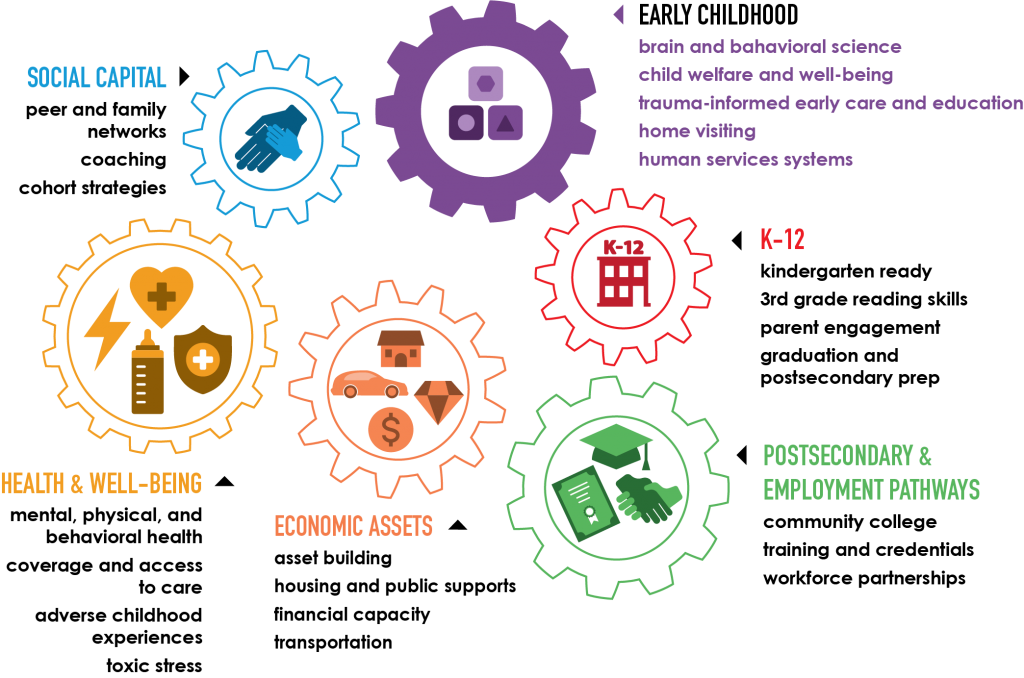Investing in Futures Means Investing in Families: Announcing the Two-Generation Prenatal to Three Learning and Action Community
The COVID-19 pandemic has made more evident than ever the need to transform policies, practice, and systems to build upon the inherent resilience of families – especially those with low incomes and from BIPOC communities.
In 2018 – 677,529 children experienced maltreatment in the US. 51 percent of those children were Black, Indigenous, or children of color; and the largest group of children experiencing maltreatment did so in the first year of life. In 2017, 35 percent of children who experienced maltreatment did so from birth to age 3.
The challenge and opportunity to rebuild systems and help families recover is why Ascend launched the Two-Generation Prenatal to Three Learning and Action Community (2GP3 LAC). Tapping the expertise and experience of families, Ascend Fellows, and the Ascend Network, this work will interrogate the systems, practices, and policies that contribute to these outcomes and suggest a path forward that builds upon the inherent resilience of young children and families for better outcomes.
TWO GENERATION PRENATAL – 3 LEARNING & ACTION COMMUNITY
- Lola Adedokun, Program Director for Child Well-Being and Director for the African Health Initiative, Doris Duke Charitable Foundation
- Frank Alexander, Managing Director, Judicial and National Engagements, Casey Family Foundation
- Anthony Barrows, Managing Director, ideas 42
- Randall Baylor, HealthySteps Family Service Associate, Children’s National Hospital
- Kristin Bernhard, SVP Advocacy and Policy, Start Early
- Reggie Bicha, President, Shine Early Learning
- Matthew Biel, Division Chief of Child and Adolescent Psychiatry, Associate Professor of Clinical Psychiatry and Pediatrics, Georgetown University/Medstar
- Janeen Comenote, Executive Director, National Urban Indian Family Coalition
- Matthew Dodson, Director, Archuleta County Department of Human Services
- Joelle-Jude Fontaine, Senior Program Officer, The Kresge Foundation
- Anna Marie Garcia, Vice President of Early Childhood Education, LANL Foundation
- Gretchen Hammer, Founder, Public Leadership Consulting Group
- Tameka Henry, Board Chair, Acelero Learning
- Cemaré James, Interim CEO, National Black Child Development Institute
- Deidre Johnson, CEO and Executive Director, Center for African American Health
- Elizabeth Kehret, Service Coordinator, Early Childhood Services, Lutheran Services in Iowa
- Sherry Lachman, Associate Director for Education, Income Maintenance, and Labor, White House Office of Management and Budget
- Georgia Mjartan, Executive Director, South Carolina First Steps to School Readiness
- Cynthia Osborne, Associate Dean for Academic Strategies, University of Texas LBJ School of Public Affairs
- Jeannette Pai-Espinosa, President, National Crittenton Foundation
- Erica Phillips, Chief Operating Officer, All Our Kin
- Michelle Rhone-Collins, CEO, LIFT
- Rebecca Riley, Early Childhood Consultant and Community Health Educator
- Yvette Sanchez Fuentes, Associate Secretary for Early Childhood Support, Delaware Department of Education
- Michelle Sarche, Associate Professor, University of Colorado -Denver
- Ann Silverberg Williamson, Founder, Silverberg Partners LLC
- Darius Tandon, Associate Professor, Medical Social Sciences, Northwestern University Feinberg School of Medicine
- Lorelei Vargas, Executive Director, Trinity Commons
- Stephanie Villafuerte, Child Protection Ombudsman, Office of Colorado’s Child Protection Ombudsman
The two-generation (2Gen) approach to family well-being is grounded in the body of research that underscores the importance of investing in children and their caregivers together, especially in the earliest years. Economists, service providers, and families affirm the powerful return on supporting family units holistically.
What the data tells us:
- Investments in high-quality early education yield a 13% per year return on investment based on increased school and career achievement as well as reduced social costs.
- A $3,000 difference in parents’ income when their child is young is associated with a 17% increase in the child’s future earnings.A relatively small increase in household income can have a significant, lasting positive impact on the life of a child.
- A $1 increase in the minimum wage would decrease child neglectby almost 10%.
2GP3 LAC priorities will include reframing the field’s approach to child welfare to reflect a preventative, strengths-based, and whole-family orientation to capitalize on provisions of the Family First Prevention Services Act and state and local efforts to more effectively align early childhood and health funding, systems, and services.
New research into the transition to parenting has critical implications for this work. University of Denver researchers Pilyoung Kim and Sarah Watamura found that parenting brain changes happen in all primary caregivers – including fathers and non-biological parents in addition to biological mothers – in response to the caregiving role. This co-occurring period of neuroplasticity provides a unique opportunity to effect changes that improve outcomes for whole, 21stcentury families.

Leveraging the 2Gen approach, the 2Gen P3 LAC will honor the diversity of 21st century families as they define themselves and build upon the following principles:
- Center Families: Undergirding all of Ascend’s work — from principles to practice to policy — is a commitment to listen to families and ensure their expertise and experiences inform program and policy design.
- Ensure Equity: Two-generation strategies should evaluate and fix structural problems that create or maintain gender and/or racial and ethnic disparities.
- Foster Innovation and Evidence Simultaneously: Tap insights from prior evidence-based research and build a deliberate pipeline to ensure evidence-informed innovation.
- Strengths-Based and Preventative Approach: BIPOC families, especially those with low incomes, are inherently resilient and possess the capacity to ensure the health and well-being of their families. We have an opportunity to support their journeys to prosperity by removing systemic barriers and building upon their assets.
Ascend Fellows Katie Albright, CEO of Safe & Sound and Myra Jones-Taylor, chief policy officer at ZERO TO THREE will guide this work toward the most important levers of federal, state, and local policy, funding, research, and practice to more effectively support children, caregivers, and families in the earliest years.
This work will build upon that of Ascend’s annual Early Childhood and Health Forum and the Aspen Virtual Roundtable Series: Stronger Early Childhood Systems for Better Child and Family Outcomes. This work convened state, federal, and local systems leaders, caregivers, researchers, practitioners, parents, and philanthropists to inform and support comprehensive and aligned early childhood and health systems.
Undergirding all of Ascend’s work — from principles to practice to policy — is a commitment to listen to families and ensure their expertise and experiences inform program and policy design. Names bolded on the above list of partners are parent representatives to the 2GP3 LAC.
Related Posts



